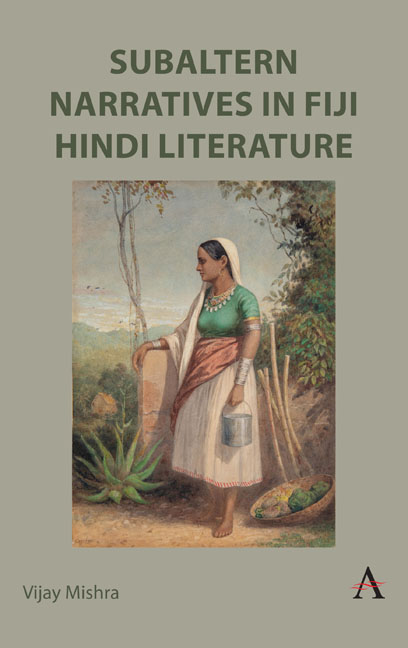Book contents
- Frontmatter
- Dedication
- Contents
- Acknowledgements
- A Note on Transliteration
- Map of Fiji
- Foreword: On the Genesis of Ḍaukā Purān
- Introduction: Reading the Fiji Hindi Demotic
- 1 Introduction: Reading the Fiji Hindi Demotic
- 2 The Moment of Ḍaukā Purān
- 3 Fījī Māṁ: The Female Subaltern Epic
- Conclusion: Can the Subaltern Speak? Language Itself Speaks
- Appendix: Glossary of Fiji Hindi and Fijian Words
- Select Bibliography
- Index
2 - The Moment of Ḍaukā Purān
Published online by Cambridge University Press: 13 April 2024
- Frontmatter
- Dedication
- Contents
- Acknowledgements
- A Note on Transliteration
- Map of Fiji
- Foreword: On the Genesis of Ḍaukā Purān
- Introduction: Reading the Fiji Hindi Demotic
- 1 Introduction: Reading the Fiji Hindi Demotic
- 2 The Moment of Ḍaukā Purān
- 3 Fījī Māṁ: The Female Subaltern Epic
- Conclusion: Can the Subaltern Speak? Language Itself Speaks
- Appendix: Glossary of Fiji Hindi and Fijian Words
- Select Bibliography
- Index
Summary
There are few works of world literature that may be unproblematically categorized as subaltern writing. As the voice of peoples marginalized by the grand narratives of world history, including that of colonization, they exist as ephemeral entries (often via translations) in critical discourses on subaltern theory and practice. As autonomous, self-defining texts representative of that voice the examples are few. This is true as well of plantation Indian history (the general backdrop of this study) where once again the texts, often orally transmitted, exist only as fragmentary narratives. A proper intertextual framing of subaltern works is therefore impossible. However, there are a few challenging and defiantly exclusive subaltern texts in the critical bibliography of the field, and these may be mentioned: poems and prose works by Trinidadian and Guyanese Indians such as David Dabydeen, Kumar Mahabir and Rooplall Monar, plays by the Mauritian Patois French writer Dev Virahsawmy and the poems of the Suriname Bhojpuri writer Jit Narain.1 This is an incomplete and partial list that needs correction. In these limited citations, the one work that stands out is Dev Virahsawmy’s dramatic re-rendering of Shakespeare’s The Tempest as Toufann (‘Tempest’). But even as one concedes the power and originality of Virahsawmy’s challenging work, there is nothing in the Indian plantation subaltern literary archive remotely comparable to Subramani’s monumental novels Ḍaukā Purān and Fījī Māṁ (hereafter the latter without diacritical marks and given as Fiji Maa). As already noted, they are works of such exceptional power and originality that they require not only critical analysis but also critical exposure. This chapter is aimed at filling that need with reference to the first of the two novels by Subramani written in the Fiji Hindi demotic.
Subramani’s Ḍaukā Purān (‘The Subaltern Tale’ as I have translated the title) is a rich, indeed seminal, text through which we can talk about subaltern voice and speech. Many books and essays have been written about plantation and post-plantation Fiji history, but there is no work that explores life worlds through which an alternative, subaltern, narrative could be theorized.
- Type
- Chapter
- Information
- Subaltern Narratives in Fiji Hindi Literature , pp. 43 - 108Publisher: Anthem PressPrint publication year: 2024



